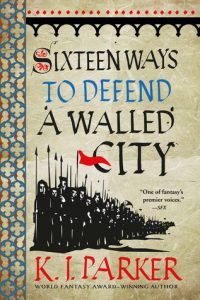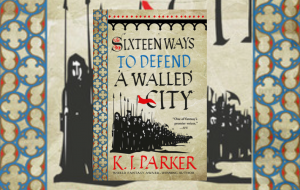SIXTEEN WAYS TO DEFEND A WALLED CITY by K. J. Parker (Book Review)
 Sometimes I adore an audio book, and it’s hard for me to tell how much of my enjoyment stems from the narration, and how much from the book itself. This is just such a book, though on reflection I think the answer is a strong “both are great.”
Sometimes I adore an audio book, and it’s hard for me to tell how much of my enjoyment stems from the narration, and how much from the book itself. This is just such a book, though on reflection I think the answer is a strong “both are great.”
The narration is in first person, so the protagonist (voiced by Ray Sawyer) tells us his own story. Said protagonist, Colonel Orhan, is such an outstanding character, I’m tempted to place him among my all-time favorites. He’s the leader of a corps of engineers, which is part of a fictitious Roman-like Empire whose armies control most of the known world. One thing leads to another, and Orhan finds himself defending the empire’s greatest city, with only the barest skeleton of a defensive force, from a huge and unexpected invading army.
You’ll hear a lot of engineering details in this book, about materials, construction, siege equipment, and supply chain logistics, but it all felt seamless and proper in its place. Orhan/Sawyer’s wonderful delivery makes every sentence feel important. There’s still plenty of excitement to be found, but don’t expect 350 pages of Helm’s Deep.
Colonel Orhan makes the book. He’s a world-weary, no-nonsense fellow with a practical engineer’s outlook on just about everything. He’s also an unreliable narrator, constantly self-effacing at the same time he’s devising clever plans, and declaring things about himself that are in direct opposition to his words and actions. He’s willing to bend bureaucracy to the breaking point and beyond to get things done, and wants neither credit nor blame for anything, but ends up accruing both in great quantities as he attempts to devise both social and military solutions to a host of logistical and interpersonal problems. Sometimes his best ideas fail. Sometimes he gets lucky. Sometimes he’s a genius who ekes out another day or week for the city. Is Orhan a hero? Certainly not, he would say. But the book asks the reader, clearly but indirectly, to consider that question over and over again, and the answer never seems wholly obvious.
There’s also a slow, steady thread on colonialism and race running through Sixteen Ways. The empire Orhan serves treats him as a second-class citizen due to his race, since he belonged to one of the nations they conquered along the way. His reflections on the ironies imposed, as he does his damnedest to save the capital of his conquerors, are anything but black-and-white. I found them very thought-provoking, and the sardonic, at times fatalistic tone of the narration really drives home, often uncomfortably, some ambiguous questions of morality.
The writing throughout is solid, character-consistent, and doesn’t stint on descriptions of men and women mangled by siege weaponry. I never found the pace lagging, nor grew impatient to get past some less urgent part of the story. The ending is likely to be divisive, but I thought it was brilliant. Avoiding spoilers as much as possible: The whole narrated account of the siege, along with the events that led to and followed it, is discovered in the future as a written account of some historical significance. What that future archivist makes of the written record is one of my favorite and most thought-provoking sections of the book.
A final note: this is a fantasy book that feels like borderline historical fiction, and which has no magical or supernatural elements at all. Adjust your expectations accordingly.


“…this is a fantasy book that feels like borderline historical fiction.”
I really enjoy this aspect of KJ’s works in general. He’s like the “hard scifi” of fantasy
I really loved his J W Wells & Co series that he wrote as Tom Holt, but I’ve yet to read this one. I can believe what Dorian says about it though, as with the series I have read, there was such believability in it. I remember thinking at the time, this is obviously a person who has spent a lot of time working in offices. And I think that’s what gives the impression of historical fiction, or like you say a ‘hard scifi of fantasy’, that feeling of experience and realism.
~ Beth